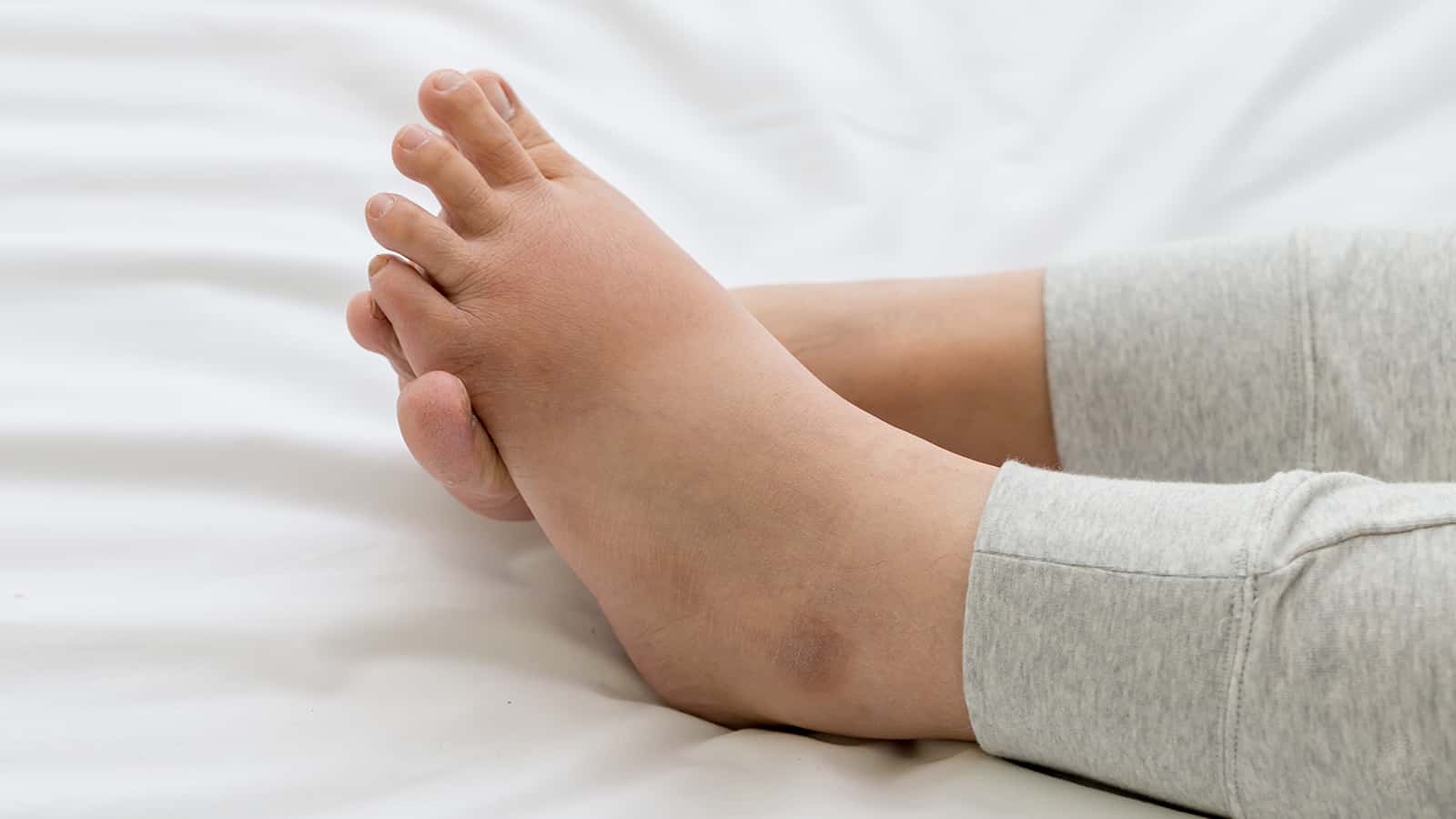Swollen ankles, aka edema in the medical world, is caused by a buildup of fluid in the ankles. Most of the time, the situation will resolve itself, but sometimes it can linger and negatively affect your quality of life. If you’re suffering from swollen ankles that won’t seem to go away, you’ll need to see a doctor. Indeed, your doctor will likely tell you that it comes from one of the scenarios that we describe in this article.
Minor Causes of Swollen Ankles
First, let’s take a few moments to look at the less severe causes on swelling in the ankles.
Being in the Same Position for Too Long
Many people who have jobs that require them to be in the same position for extended periods (administrative assistants, cashiers, drivers, assembly workers, etc.) sometimes find their shoes feel too tight and their feet feel swollen. Having this feeling is normal because when you don’t move your legs, your blood circulation decreases. Reduced blood circulation means that your legs and ankles aren’t getting rid of fluid at the rate that it should, so it begins to build up.
You should try to change positions as often as possible to prevent this from happening. Doctor Jason Johanning, M.D., professor of vascular surgery at the University of Nebraska Medical Center, Omaha, recommends either sitting or standing (the opposite of what you do all day) for at least five minutes each hour.
Being Overweight
As you know, being overweight can cause a plethora of health problems. Swollen ankles are one of those. The extra weight, especially the weight around the midsection, can press against your veins. This pressure causes blood circulation problems, which will lead to swelling in your lower half.
Unfortunately, if you’re overweight, the swelling could also come from the pressure that your ankles are under from carrying all that excess weight. Think about it – all your weight is literally on your feet so that you could be breaking down your joints. Losing weight – even a small amount – may alleviate the swelling.
Ingesting too Much Salt
Salt is a common reason that people retain too much fluid. Too much salt can also cause several other health problems. However, as many healthcare professionals put it, it’s not the salt that’s the problem. It stems from sodium.
The sodium in salt helps to regulate a bodily function known as the osmotic balance. This function deals with the body’s level of fluid retention as well as thirst levels and other factors.
When too much sodium is in your body, the balance is thrown off. The excess sodium causes the osmotic balance to retain more fluid than it gets rid of, and it also begins to make you feel thirsty. When you quench your thirst, you’re just adding to the fluid retention.
Medications
Here’s another reason to embrace healthy, natural remedies–swelling and fluid retention.
There are a lot of medicines that can cause swelling in your ankles. These medications can be prescription or over the counter (OTC) medications. Many of them are common medications that a lot of people take, but not everyone’s ankles swell. Some ankle-swelling drugs are as follows:
- Ibuprofen
- Loniten
- Apresoline
- Estrogen
- Testosterone
- Avandia
- Actos
- Antidepressants
- Steroids
- Calcium channel blockers
There are plenty of other medications that could be added to this list. If you suspect that a remedy is the cause of your ankle swelling, make an appointment with your doctor to talk about alternate medications. However, if it’s a medication that you absolutely must have, your doctor could recommend alternative ways to reduce or get rid of the swelling.
Pregnancy
Swollen ankles during pregnancy are extremely common and are usually nothing to worry about. As the baby grows, it presses on things in your body, including particular veins. This compromises your blood circulation, which, as stated before, can cause fluid to collect in your legs, ankles, and feet.
Hormonal changes during pregnancy could also be a reason. Your body may produce a hormone called relaxin during pregnancy. This hormone can cause the ligaments in your ankles and feet to relax and enlarge, which can cause swelling.
If the swelling is gradual and is in your ankles and feet, you’re likely okay. In most cases, your doctor will probably tell you to stay off your feet and elevate them as often as possible. However, if it comes on suddenly and other areas of your body like your face and hands are swelling, you may have preeclampsia, which is a medical emergency.
Serious Causes of Swollen Ankles
Next, let us review the more dangerous triggers of ankle swelling.
Angioedema
Angioedema is a type of swelling that occurs under the skin rather than on the skin. It’s due to the body detecting some foreign substance in the body, or in other words, an allergen. This type of swelling is different than hives, which can also cause swelling from allergens. However, hives are swelling on the skin instead of under it.
When an allergen enters your body, your body produces a substance called histamine, which is sent to fight the allergen. Unfortunately, this causes that part of your body to swell up. The good news is that it sometimes goes away once the allergen is gone, but you must get rid of the allergen, which may require an emergency room visit.
You can also take OTC antihistamines to make the swelling go down if the allergy isn’t too bad.
Infection
If you have a skin infection, this can cause your legs, ankles, and feet to swell. Your skin would likely be red, hot, and tender. This, paired with the swelling, is an indicator of infection over other causes.
Bacterial infection cellulitis would likely be the culprit behind an infection on your feet or ankles. This infection can come from several different causes. It could be a wound that was open and allowed bacteria to get in. It could even be a disease like rheumatoid arthritis, diabetes, gout, or lupus that caused the infection.
It’s essential to get an infection taken care of as soon as possible, or it will get dramatically worse in a short amount of time. So will the swelling.
Lymphedema
Lymphedema is a condition in which a problem with your lymph nodes causes significant swelling. In many cases, it can be your entire leg that swells, not just your ankle.
Your lymph nodes are responsible for circulating lymphatic fluid. This fluid carries white blood cells around your body to fight bacteria and infections. However, if the lymph nodes become damaged, that fluid can practically come to a halt. The collection of non-circulating fluid causes the swelling and can also cause an infection.
There are quite a few causes for damaged lymph nodes. Two of the most common reasons are surgery and obesity. It can also be damaged from issues like cancer, skin infections, radiation therapy, and genetics.
Blood Clot
People develop blood clots from sitting in the same position for an extended period. You often hear about people developing blood clots after being on a long flight. Blood clots are a severe condition and can be lethal.
Blood clots cause swelling because they create a blockage wherever they’re lodged. It may be accompanied by leg pain. If this happens to you, especially after you’ve been sitting in the same spot for a long time, get to an emergency immediately. If the blood clot dislodges, it can travel to your lungs or heart, cause a blockage, and kill you.
Heart Failure, Liver Disease, or Kidney Failure
The heart, liver, and kidneys both circulate fluid throughout your body. Kidneys help to get rid of excess fluid (when you urinate). Failure of either of these significant organs leads to less circulation and less excretion of fluids. This means that fluid builds up in your ankles as well as other parts of your body. You may have swelling equally all over the place.
How to Fix Swollen Ankles
The first thing you must do is figure out why your ankles swell. It would help if you corrected the underlying cause of the swelling. In many cases, if you take care of that, the swelling will go away.
If the condition is more serious, or it’s challenging to get rid of the underlying cause, you may have to take other measures to get rid of the swelling. Again, the underlying cause is essential here because there would be different methods of getting rid of swelling, depending on the cause.
For example, if being overweight is the problem, you may need to implement dietary changes and exercise. However, if organ failure is the problem, you may need diuretics. Compression stockings or socks are an excellent all-around solution for your ankles. In fact, vascular medicine specialist John Bartholomew, MD of the Cleveland Clinic, says that compression stockings are the best way to reduce swelling.
Final Thoughts on Recovering from Swollen Ankles
Swollen ankles are irritating and unsightly. More importantly, it’s an indicator that something else is wrong with you. In most cases, swollen ankles aren’t a life-threatening situation. You probably need to get up and get moving or implement simple lifestyle changes.
However, if your swollen ankles seem to be persistent, long-lasting, or painful, you shouldn’t delay in seeing a doctor. The swelling, along with the other symptoms, is your body’s way of telling you that it needs attention. Be attentive and take care of the problem before the swelling becomes the least of your concerns.
















 Community
Community

